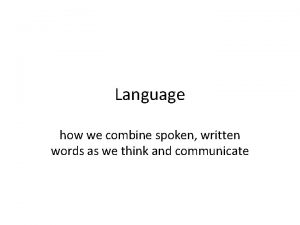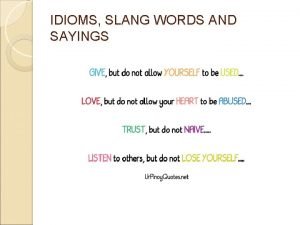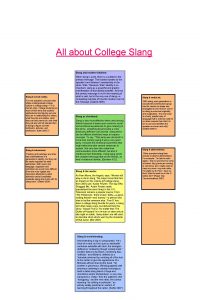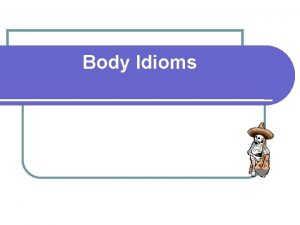Origin of English idioms and slang words Written

















- Slides: 17

Origin of English idioms and slang words Written by: K. Shitova Class: 10 IM, lyceum “Dubna” Teacher: E. Golovina

Introduction Idiom - a group of words whose meaning cannot be predicted from the meanings of the constituent words, or linguistic usage that is grammatical and natural to native speakers of a language. Idioms can be professional (only specialists know what they mean), they can be used only by students, children, etc. Slang - something that is not appropriate to the standard form of a language or to formal contexts, and is characteristically more metaphorical and transitory than standard language, is a special part of a language. Words to the wise Animals Slang words Words with many variants of origin

Words to the wise. Once in a blue moon This expression appeared in the 16 century, from the rhythm that the moon was made of green cheese. But some people now say that on crystalclear nights, or in areas full of volcanic ash, the moon does appear blue. Буквальный Example: перевод You know how these «однажды, когда peasants eat: macaroni луна посинеет» on Sundays and meat once in a blue moon. (W. S. Maugham, ‘Complete Short Stories’, ‘The Lotus Eater’) Русский эквивалент: Реальный перевод «никогда» , «очень редко» «Когда рак на горе свистнет»

Words to the wise. Long in the tooth It’s just the old person. This expression first appeared in the book of J, C. Snaith ‘Love Jane’(1919), and originally it referred only to horses. The older the horse is, the longer its teeth look. Буквальный перевод «Слишком длиннозубый, чтобы» Реальный перевод «Опытный или пожилой человек» Example: He was too long in the tooth to fool round with dynamite, like talking about a big slug that did not exist. (K. S. Prichard, ‘The Roaring Nineties’, ch. 56)

Words to the wise. Pardon My French It started circulating on both sides of the Atlantic around 1916 and so almost certainly stems from the World War I escapades of American and British soldiers. People say that when they apologize for something. Example: What she needs is a kick, pardon my French — Ей просто нужно задать перцу, вот и все, извините, если я не так выразился. Буквальный перевод Реальный перевод «Пардон за мой французский» «Извиняюсь» , «Извините за выражение»

Words to the wise. To give someone the cold shoulder When guests would overstay their welcome as house guests, the Hosts would (instead of feeding them good, warm meals) give their too-long staying guests the worst part of the animal, not warmed, but the COLD SHOULDER. Example: l. She Буквальный перевод Реальный перевод Подать холодное плечо (кому-то) Холодно, сухо, неласково с кемто обойтись cold shouldered the guy who was rude to her— Она холодно обошлась с тем парнем, который ей нагрубил.

Animals. White elephant Siamese, one of the tribes in Africa, considered them sacred, and any captured white elephant (they were not so rare) became the property of emperor. Оne of the emperors invented the terrible way of punishment for his courtiers – he offered them this elephant. The animal ate, ran around the house, destroyed the fences and roofs… And his master was not allowed to ride it by law! Many courtiers simply couldn’t afford the upkeep of the elephant and became just financially ruined. Example: The pavilion has become a £ 14 million steel and glass white elephant. Буквальный перевод Реальный перевод Белый слон Ненужная, никчемная вещь, которую по каким-то причинам нельзя выбросить;

Animals. Dog days That means the hottest and driest days in the summer. Or someone’s bad days when one feels very much uneasy and uncomfortable. It comes from the Roman times when a constellation of a Dog existed. Days where you could see this constellation were called Dog days (they began in the middle of the summer). Буквальный перевод Реальный перевод Собачьи дни Самые жаркие летние дни; «не твой день» Example: These dog days in our town are annoying for me. I have a headache because of the heat.

Slang words. Hobnob does back to Habben (to have) and Ne habben (to have not). It ‘s a contraction of these two words. They are both Middle English. And the second version – it described the custom of alternating purchasing rounds of drinks (having or not having the next one). Example: Jane's mother likes to hobnob with the leading women of the city. Meanings Honcho This is a leader or boss. This expression was brought to the USA from fliers stationed in Japan during World War Two. In Japanese Example: that means ‘a She’s leader of the editor-in-chief of squad’, and our magazine, our American began honcho, almost a to use it too. legend. To chat socially (быть на короткой ноге с) Boss (начальник)

Slang words. Eavesdroppers Examples: Look out! You needn’t any eavesdroppers to hear our conversation, do you? From the 16 through the 19 centuries houses were surrounded by eavesdrops, spaces where water dripped from the eaves. It was invented to provide the security of the foundation(to make rain fall far enough from the house). The first eavesdroppers stood there to hear private conversations. Буквальный перевод Реальный перевод Eave- карниз Drop- бросать, кидать Те, кто подслушивает

Many variants of origin. To keep a stiff upper lip Translation Meanings Examples Держаться, • Moustache fashion Don’t be a стойко выносить чтолибо, не терять лица • How to behave yourself in court • A piece of advice for singers baby! Keep a stiff upper lip!

Many variants of origin. Minding your p’s and q’s Translation Meanings Examples Следить за тем, что делаешь и как себя ведешь; Не совать нос не в свое дело; • Your pints and You, mind your p’s and q’s, I don’t think I need your comments here! quants • Your Price and Quality • Your pease and kyuse • Buttons on your typewriter • Etc.

Many variants of origin. Saved by the bell Translation Meanings Спасен в последний Tradition of some момент, чудом tribes (connected with the dead) Box gong (or bell) Saved from evil spirits by the church bell Etc. Examples The boss was going to bawl me out and I was actually saved by the bell when you came in

Many variants of origin. To burn the candle at both ends Translation Meanings Examples 1. Прожигать жизнь 2. Работать, не щадя себя • Getting rid of The chemist brought the draught. ‘Not sleeping, sir? ’ ‘No. ’ The man’s eyes seemed to say: ‘Yes. Burning the candle at both ends - I know!’ (J. Galsworthy, ‘Caravan’, ‘The First and the Last’) — Аптекарь принес лекарства. - Не спите, сэр? - Нет. Его глаза, казалось, говорили: «Ясно. Загуляли. Я это понимаю» guests • Night working • Getting up early and going to bed late • Etc.

Many variants of origin. Rule of thumb Translation Meanings Examples 1)повседневное правило (основанное на опыте, а не на научных знаниях) ; практический способ; житейские соображения; • Wife beating You want a real explanation and not a mere rule of thumb. (B. Shaw, ‘The Intelligent Woman’s Guide to Socialism and Capitalism’, ch. 55) —. . . вам нужно точное объяснение, а не сделанное на глазок. • Beer brewing • Painter’s thumb • Same to an inch • Baker’s thumb

Many variants of origin. Tie the knot Translation Meanings Выйти замуж • Ropes on the (пожениться), marriage bed обвенчаться • Old sailors’ custom • Necklace of flowers around the neck of a bride • A knot connecting hands of the couple during the ceremony Examples It’s hard to find somebody to tie the knot at that hour — Кого ты в такой час найдешь, чтобы вас обвенчали?

The end Thanks for your attention!
 Idioms are figures of speech
Idioms are figures of speech Tin lid aussie slang
Tin lid aussie slang Slang words
Slang words N slang words
N slang words Dominican slang
Dominican slang Bdl slang
Bdl slang The gap between written and spoken english
The gap between written and spoken english Kurgan hearth theory
Kurgan hearth theory Art of combining spoken and written words
Art of combining spoken and written words Hanácky slang
Hanácky slang Slang shading language
Slang shading language Staroslovanstina
Staroslovanstina Krochna
Krochna Insulinkanyler
Insulinkanyler Jargon examples in english
Jargon examples in english Proverb sport
Proverb sport Me old china cockney rhyming slang
Me old china cockney rhyming slang Smtms slang
Smtms slang





























